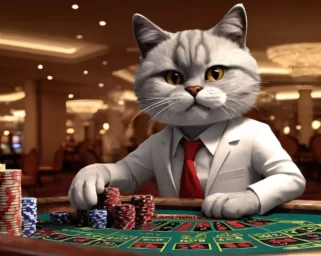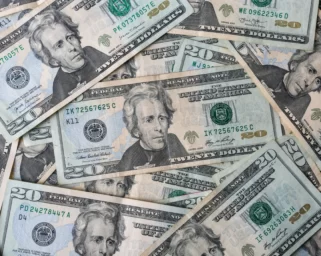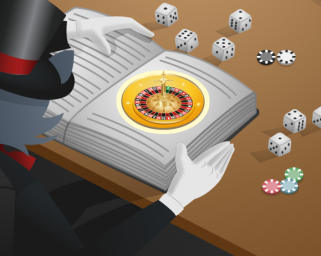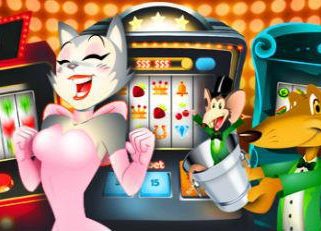Ever wonder about gambling in London? Gambling whether at land-based or online casinos is a big deal, a real big deal. By the end of this year alone, experts predict that the combined annual revenues from casino games to be in the hundreds of billions of dollars for online casino operators alone. This is a staggering sum when taking into consideration that we are not even mentioning the popularity of traditional brick and mortar casinos.
There are many attractive gambling destinations. They each draw in the likes of everyone from high rollers and professional gamblers to the wealthy and middle classes. The bright lights of Las Vegas and the sunny Cotai Strip in Macau are premiere destinations for all types of gambling games. However, of all of the world’s favored casino hubs, one light that has shone the longest if not the brightest is London, England. Read on for more info on gambling in London.
A History of Wealth
England, at one point, controlled almost one quarter of the world’s territories through its global expansion and various dealings in trade, colonialism, industrial prowess and naval strength. The British royal family was once the single richest dynasty in the world. This cemented London as a city of unprecedented wealth and economy. The Industrial Revolution brought on a myriad of entrepreneurships, factories and flourishing businesses. They all contributed to the surplus of an already affluent city.
And Poverty
However, London was not without its turmoil. The city had a large class disparity. Despite its appearance of grandeur, many of its citizens suffered in poverty. Despite all of this, one constant has endured, gambling. From kings, queens and princes to prisoner and peons, the city’s obsession with all things gambling remains unchanged. London is, and has always been a magnate for the lucky (and unlucky) to risk their fortunes. So without further ado, CoolCat Online Casino looks at a brief history of gambling in London.
London and Gambling Origins
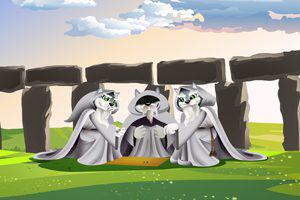 London’s rich cultural tapestry features many highlights, yet one overlooked aspect is its long history of gambling. Gambling has existed in various forms throughout the world and in Europe since the Stone Age. In Britain, gambling went on as far back as the Roman period.
London’s rich cultural tapestry features many highlights, yet one overlooked aspect is its long history of gambling. Gambling has existed in various forms throughout the world and in Europe since the Stone Age. In Britain, gambling went on as far back as the Roman period.
Gambling in Roman Times
After the founding of London in 47 A.D., it didn’t take long for Britons to adopt Roman customs, law, and religion under Roman rule. And that included betting and games of chance. Although technically forbidden by Roman law, people of all classes loved to gamble. The most popular of these were dice games. By 410 A.D., however, the Roman Empire fell, and London entered the Dark Ages.
The Crusades and After
Little is known of London during this period. Yet by the time of the Crusades in the 12th and 13th centuries, a popular dice game known as hazard began to emerge in England. Today, its descendant, craps, is enjoyed in casinos worldwide. By the late Middle Ages, just before the spark of the Renaissance, playing cards became popular throughout much of Europe. This was due to the invention of the printing press.
The Rise of Card Games
Introduced to Britons by the French, gambling with playing cards caught on like wildfire. In fact, it became so popular that by the time of the Tudors, King Henry VIII notoriously banned gambling throughout England. He claimed that it distracted his soldiers from their duties.
The irony is that King Henry was an inveterate gambler himself, yet it would remain legal for the wealthy. Traditionally, the rich were known to wager their fortunes on anything from horse racing to jousting and hunting events to cockfights and combat. Lower classes would continue to enjoy betting against one another in dice and card games.
Enter the Lottery
However, like any “good” monarchy, the British Empire had its sights set on expansion. Amusingly, King Henry’s own daughter, Queen Elizabeth I, authorized England’s first national lottery in 1569. Common people could now participate to win coveted jackpots, the first of these amounting to £5,000. Incredibly, the jackpot also included immunity from arrest for petty crimes to the winner.
The newly formed lottery helped raise tax revenue, and turned out to be very successful. Kings James and Charles I used the lottery to fund everything from London’s water supply to the expeditions of the Virginia Company, which established the first colonial settlements in North America. Proof that gambling in England had an immense impact on not only London, but also the empire itself.
Gambling in London Continues
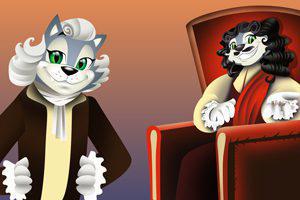 In the late 17th century, a man by the name of Sir Thomas Neale became the king’s official croupier. One of his tasks included ensuring that his Majesty’s table be stocked with dice, cards and people willing to lose against him.
In the late 17th century, a man by the name of Sir Thomas Neale became the king’s official croupier. One of his tasks included ensuring that his Majesty’s table be stocked with dice, cards and people willing to lose against him.
The First Gambling Czar
In 1684, King Charles II granted Neale real power as the overseer of gambling in London. The prevalence of the various gambling houses of the city were host to quite a few nefarious and illegal activities. Neale’s main objective was to shut down London’s illegal gambling dens. Although the government tolerated gambling among the aristocracy, it was still illegal among the poorer class. However, this did not stop them from setting up sessions in London’s many pubs.
Neale also invented a pair of dice that would prevent cheating. For his lasting impact on tackling gambling in the city, King Street was renamed to Neale Street, and still exists just north of Covent Garden in London’s West End.
Gambling Goes Commercial
The mid-18th century saw the world change with the Industrial Revolution, and provided framework for commercialized gambling in London. Before this, it was seen more as a leisure activity, not a commercial endeavor.
Gentlemen’s clubs cropped up all over London. They offered everything from card games to roulette. Horseracing became the British national pastime, only increasing the popularity of betting on horseracing. Designated gaming establishments existed for the upper class. Meanwhile, the poor had to settle for illegal pitch and toss games at their local watering holes.
Two card games that were immensely popular in England during this time were Pharo and Basset. Pharo was as popular in London as poker is today. In Pharo, players place bets against a dealer based on a single deck of playing cards. If a winning card is accurately predicted the player wins their bet. The game involves a complicated betting system, and at the time caused many accusations of cheating only increasing its notoriety among the more sinister gambling dens.
From Gambling Prohibition to Polo Ponies
 By the 1800s, religious zealots, high-profile betting frauds, corrupt lotteries and a general social climate on the immorality of gambling led to the British Parliament passing the Gaming Act of 1845 and the Betting Act of 1853, respectively. New laws prohibited most avenues from profiting from gambling in London.
By the 1800s, religious zealots, high-profile betting frauds, corrupt lotteries and a general social climate on the immorality of gambling led to the British Parliament passing the Gaming Act of 1845 and the Betting Act of 1853, respectively. New laws prohibited most avenues from profiting from gambling in London.
Gambling as a Crime
However, betting remained legal at the horse track, and wealthy members of society seldom faced repercussions. For the lower class, the laws pushed a hive of gambling activity into the streets. In 1906, the Street Betting Act was created, criminalizing gambling in public spaces. Ultimately, the gambling urges of common people proved the laws ineffective, and unregulated gambling led to an increase in various other crimes in the poorer districts of the city.
Regulation
By the early 20th century, government offices in London determined how to regulate gambling in order to reduce the increase in crime and to once again boost tax revenues. This led to the decision that certain vendors be given permission to operate. For instance, Ladbrokes, one of Britain’s largest and oldest gambling companies, moved to London after being founded by three horse commission agents in Ladbroke Hall in Warwickshire.
Private gambling continued under the roofs of the men’s clubs, visited by wealthy businessmen gambling on anything from baccarat to backgammon. Even one of the most notable figures of the 20th century, Sir Winston Churchill, was known to gamble with family money as a younger man. When not in London, he would visit the Monte Carlo, and his outlandish spending habits included splurging on everything from expensive wines to polo ponies.
Licensed betting
After the Second World War, new gambling legislation in Britain legalized betting in licensed shops under government supervision. The 1960 Betting and Gaming Act passed and some 16,000 vendors received licenses to maintain small time gambling operations throughout the U.K.
The First Casinos
By 1962, London opened its first official casino, the Clermont Club, which still operates today. Owned by the wealthy John Aspinall, he brought the allure of gambling in London back into the spotlight by regularly hosting exclusive parties with celebrities and members of high society.
Unfortunately, the new casino laws did not stop certain illicit organizations or even legitimate businesses from having criminal ties. The most famous being Esmeralda’s Barn, a nightclub and casino run by the notorious Kray Twins, two of London’s most prominent criminals. Despite their reputation, the Krays rubbed shoulders with the likes of Frank Sinatra and Judy Garland and even England’s most famous painter, Lucian Freud. He owed them a whopping £500,000 at one point due to his massive gambling habits.
The magnetism of the London casino scene was potent, and the new casino craze only became more enticing with the emergence of one of England’s most famous literary and film characters: gambling super spy James Bond, for whom the game of choice was baccarat.
Modern Gambling in London
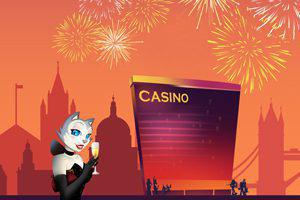 By the end of the 20th century, the Gaming Board of Britain, the regulatory body for casinos and bingo halls, established the National Lottery in 1994.
By the end of the 20th century, the Gaming Board of Britain, the regulatory body for casinos and bingo halls, established the National Lottery in 1994.
The rise of the internet saw the launch of online gaming and online casino gambling.
Competition with casino and betting shop owners led to pressures on the government to create looser gambling regulations, so the 2005 Gambling Act appeared. Among other things, it allowed for the advertising of gambling so long as operators included measures to address problem gambling.
Mass Market Advertising
By 2007, casino advertising became even more lenient in England. For instance, betting shops were no longer required to cover their interiors from public view. Ultimately, this led to more revenue for both vendors as well as the government. Since 2010, an estimated 0.5% of the U.K.’s GDP comes from taxed gambling revenue. The various betting shops and casinos now employ more than 100,000 people, and generate over £700 Million each year in tax revenue. An overall success for the economy despite the rocky history of gambling in London.
Glamorous Faces in High-End Places
Today, London is home to some of the world’s most exclusive, high-end casinos, particularly in the prestigious Mayfair district in London’s West End. Many millionaires, business tycoons, carp sharps, celebrities and sultans have parted with their fortunes in the Mayfair district. Listed are some of the most glamorous casinos within the district, catering to the highest of high rollers.
Les Ambassadeurs
The famous scene from the Bond film “Dr. No”, when Sean Connery suavely lights a cigarette at the Baccarat table and introduces himself to the world with the celebrated line “Bond. James Bond” takes place in this high-end Mayfair casino. Annual premier membership to this respected establishment costs £25,000. “Les A”, as it is better known, occupies a superb Georgian-era building once owned by Leopold de Rothschild in the 19th century.
Clermont Club
Long considered the cream of Mayfair, the Clermont Clubs’s original members included dukes, earls and cabinet ministers. The club occupies a series of rooms on three floors. Since its grand opening, the casino has attracted the rich and famous, including Ian Fleming and Kerry Packer. Nowadays, this elegant establishment sees high rollers from Asia and the Middle East, and people who have the kind of coin to wager incredible sums of money.
The Ritz Club
This establishment is less of a casino and more of a palace because of its opulence. The famed Ritz Club attracts some of the world’s most famous patrons. This casino opened its doors in 1978, and the Summer Palace of St. Petersburg directly inspired its spectacular decor. The salle privee regularly sees wins that can soar to the tune of millions of pounds, as well as an elite list of clientele that pass through the doors including Al Pacino, Price Albert of Monaco, Johnny Depp and Tony Blair. Maximum bets at this high-end casino can range as high as £250,000.
Crockfords
Elite gamblers will tell you that this casino’s private suites sure know how to pamper the players. Each comes stocked with free Krug champagne, Beluga caviar and lobster. It is based on the private gentlemen’s club established by William Crockford in 1828.
At the time, Crockford was one of the wealthiest men in England and brought gambling to the elite in London, establishing the status of Mayfair as a premier gambling destination. The modern Crockfords Casino is based on the original’s design and now welcomes high rollers from around the world in droves.
Aspinall’s
A discreet, residential exterior masks a gambling house of premier exclusivity and posh. You will be sure to find tuxedoed gents puffing on expensive cigars and sipping brandy, as they roll the dice over fine, purple velvets and felts.
“Oofys”
Ooofys, as they are known within the gambling cliques of London, are the wealthy men who can throw down some serious bets during a night out on the town. Not long ago, one lucky player walked out with nearly £12 million in winnings, and even forced the Ritz to temporarily shut down in search of additional finances.
Conclusion
So there you have it! A brief history of gambling in London, and as you have learned, gambling has and will continue to be a huge part of the culture of England. London casinos, betting halls and operators are immensely popular, and with the advent of online gambling along with England’s lenient gambling laws, casino games will continue to be a staple of the community; as beloved as the Queen of England or a pint of bitter and fish and chips.
Now that you feel like a real history buff, why not take a moment to familiarize yourself one of the best places for online gambling with CoolCat Online Casino. We offer over 220 exciting online casino games to choose from and a chance to win big. Simply register for a free account and make a minimum deposit to start playing your favorite online casino games today, and to win real money!




